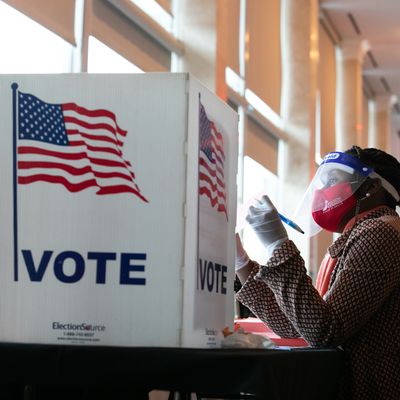
Republican Governor Brian Kemp on Thursday signed into law a measure passed by Georgia’s Republican-controlled legislature to restrict voting rights in reaction to Democratic gains there last year. While it’s not the “Jim Crow 2.0” critics feared — and that earlier versions threatened — the new law shows a determined effort by Republicans to restrict voting in order to claw back power.
The bill imposed a new ID requirement on those wishing to vote by mail and tightened deadlines on mail ballots. It also restricted mail ballot drop boxes, banned provisional ballots for votes cast in the wrong precinct, and perhaps most ominously, allowed for state takeover of election administration from county election boards if it deems such interventions necessary.
The legislation also overhauled rules governing Georgia’s unique general election runoffs, which produced two Democratic wins in January that gave Democrats control of the U.S. Senate. Going forward runoffs will occur four weeks after the general election, with very limited time provided for the early voting on which Democrats generally, and minority voters specifically, tend to rely. The new law also eliminates special election non-partisan “jungle primaries” like the one held last November to choose someone to fulfill the rest of the term of U.S. Senator Johnny Isakson, who resigned for health reasons. Now parties will hold primaries before a general special election to fill vacancies. The idea may be to give Republicans more time to recover from the kind of intra-party fisticuffs engaged in by appointed Senator Kelly Loeffler and right-wing challenger Doug Collins before Loeffler’s runoff loss to Raphael Warnock.
Democrats in Atlanta and in Washington are attacking the legislation with varying degrees of heat, with one Black Georgia legislator actually being arrested by state troopers for trying to talk to Kemp about it while he was holding his presser on the subject:
Still, the bill could have been much worse from a voting rights perspective. At varying points in the process, some Republican legislators were promoting the abolition of no-excuse voting by mail (which Republicans themselves introduced in 2005) and elimination of Sunday in-person early voting (in a transparent effort to stop the tradition of “souls to the polls” events traditionally held by Black churches after Sunday worship). The final version of the bill left no-excuse voting by mail in place, and actually mandated two weekend early voting days that by local option could be switched to Sundays. This provision is feeding Republican spin that the entire bill is somehow pro-voter:
The bill is probably best understood as a compromise worked out between the two wings of the Georgia GOP: Trump loyalists who claim to believe loose voting rules “stole” Georgia for Biden and two Senate seats for Jon Ossoff and Raphael Warnock; and those including Kemp and secretary of state Brad Raffensperger who don’t buy the stolen election rap but still favor voter suppression as a way to improve their party’s odds in a closely contested state.
Aside from the ripe-for-abuse state takeover provision, the most troublesome part of the bill from a voting rights point of view is the switch from verification of mail ballots by signature authentication against voter registration files, to the new requirement for ID that must be submitted with applications to vote by mail and with the ballots themselves. This requirement adds two additional steps to the process for all voters, and a potential bar to participation for others, as the Atlanta Journal-Constitution reported: “About 3% of registered voters don’t have a license or state ID number on file, and they would need to submit additional documentation.” It’s a provision almost sure to attract a lawsuit and judicial review.
While this legislative activity ends the GOP effort to roll back voting opportunities for now, the state will continue to be ground zero for fights over the franchise at least through the 2022 elections, which are expected to be very competitive, and where Kemp and Raffensperger may be fighting primary challenges from Trump-backed pols who will argue they are soft on “voter fraud” and too sympathetic to minorities. It’s worth noting that above and beyond the current bill’s provisions, there’s a tradition of Republican secretaries of state (most notably Kemp) using aggressive purges of voting rolls to target young and minority voters. That could be very much in play as Republicans deal with a likely gubernatorial race by 2018 Democratic nominee and national voting rights champion Stacey Abrams.
Let’s not forget, by the way, that the new Georgia election law is precisely the sort of legislation that would have been put on hold pending Justice Department review of its impact on minority voting rights had the U.S. Supreme Court not gutted the preclearance requirements of the Voting Rights Act of 1965. That’s another reason congressional Democrats should find a way to enact the John Lewis Voting Rights Advancement Act, restoring the VRA’s effectiveness and ensuring Lewis’s home state does not mock his memory and wreck his legacy.






























